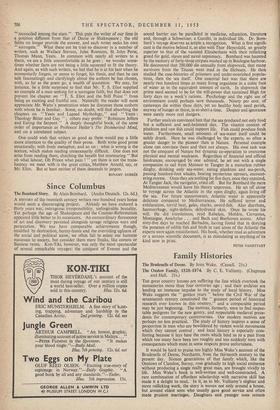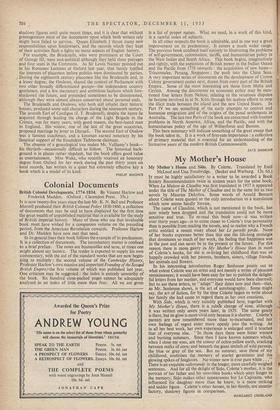Family Histories
The Brudenells of Deene. By Joan Wake. (Cassell. 21s.) THE great country houses are suffering the fate which overtook the monasteries more than four centuries ago ; and their archives are lending an immense impulse to the study of local history. Miss Wake suggests the " golden years " before the Civil War of the seventeenth century constituted the " greatest period of historical research ever known in this country," and a comparable period may be just beginning. The motives, formerly, were to find respec- table pedigrees for the new gentry, and respectable medieval prece- dents for contemporary controversies. Our modern motives are perhaps no less practical. The study of history inspires a sense of proportion in men who are bewildered by violent world movements which they cannot control ; and local history is especially com- forting because it lays bare the roots which bind us to a past from which too many have been too roughly and too suddenly torn with consequences which must in some respects prove unfortunate.
It would be hard to praise too highly Miss Wake's account of the Brudenells of Deene, Northants, from the thirteenth century to the present day. Sixteen generations of that family which, like the Onslows of Clandon, Surrey, rose gradually to high social eminence without producing a single really great man, are brought vividly to life. Miss Wake's book is well-written and well-constructed. A rare combination of effortless scholarship with narrative skill has made it a delight to read. In it, as in Mr. Vulliamy's slighter and more rollicking work, the story is woven not only around a house, but around eldest sons who usually gave good service and often made prudent marriages. Daughters and younger sons remain shadowy figures until quite recent times, and it is clear that without primogeniture most of the documents upon which both writers rely might have failed to survive. Queen Elizabeth I thrust many new responsibilities upon landowners, and the records which they kept of their activities flash a lights on many aspects of English history. For example, the Brudenells, who were prominent at the Court of George III, were non-political although they held three peerages and four seats in the Commons. As Sir Lewis Namier pointed out in his Romanes Lectures at Oxford last year, that family typified the interests of placemen before politics were dominated by parties. During the eighteenth century placemen like the Brudenells and, in a lesser degree, the Onslows, shared the control of Parliament with two other broadly differentiated groups—the independent country gentlemen, and a few mercenary and ambitious factions which fore- shadowed the future, and pretended sometimes to be disinterested, although they were almost always concerned about personal ends.
The Brudenells and Onsiows, who both still inhabit their historic houses, produced some odd characters during the nineteenth century. The seventh Earl of Cardigan (J. T. Brudenell), despite the lustre he acquired through leading the charge of the Light Brigade in the Crimea, was for many years, with good reason, the'best-hated man in England. His widow, one of the last of the great eccentrics, proposed marriage by letter to Disraeli. The second Earl of Onslow was a famous coachman, and a kinsman earned notoriety by his fanatical support of the fraudulent Tichborne claimant.
The absence of a genealogical tree makes Mr. Vulliamy's book— his thirtieth—occasionally difficult to follow. The historical back- ground is in places rather slapdash, but the book offers good value as entertainment. Miss Wake, who recently received an honorary degree from Oxford for her work during the past thirty years on local records, has written in a quiet but extremely effective key a book which is a model of its kind. PHILIP MAGNUS



































 Previous page
Previous page